英语副词分类详解
英语副词的种类
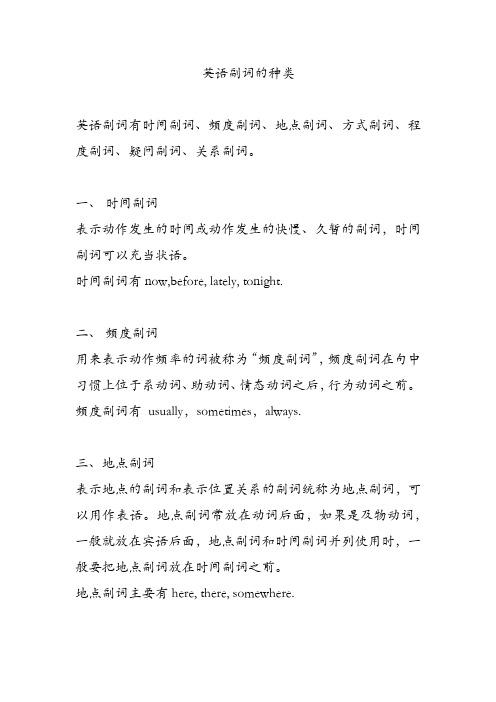
英语副词的种类英语副词有时间副词、频度副词、地点副词、方式副词、程度副词、疑问副词、关系副词。
一、时间副词表示动作发生的时间或动作发生的快慢、久暂的副词,时间副词可以充当状语。
时间副词有now,before, lately, tonight.二、频度副词用来表示动作频率的词被称为“频度副词”,频度副词在句中习惯上位于系动词、助动词、情态动词之后,行为动词之前。
频度副词有usually,sometimes,always.三、地点副词表示地点的副词和表示位置关系的副词统称为地点副词,可以用作表语。
地点副词常放在动词后面,如果是及物动词,一般就放在宾语后面,地点副词和时间副词并列使用时,一般要把地点副词放在时间副词之前。
地点副词主要有here, there, somewhere.四、方式副词方式副词表示行为动作发生的方式,可回答how引导的问句。
方式副词有quickly, carefully, calmly.五、程度副词程度副词,是对一个形容词或者副词在程度上加以限定或修饰的副词。
一般位置在被修饰的形容词或者副词之前。
语气和感觉是由它们后面的词决定的,程度副词只是说明它的程度。
程度副词有quite, very, much, too, almost.六、疑问副词疑问副词用来引导特殊疑问句,表示时间,地点,方式,原因等。
疑问副词有when, where, how, why.七、关系副词关系副词,兼有副词与连接词两种作用,在不及物动词的连接中要求用关系副词。
所引导的定语从句用于修饰主要句子中的某一名词或代名词,被修饰的词称作先行词,关系副词要放在先行词之后。
关系副词有when,where,why.。
副词的种类
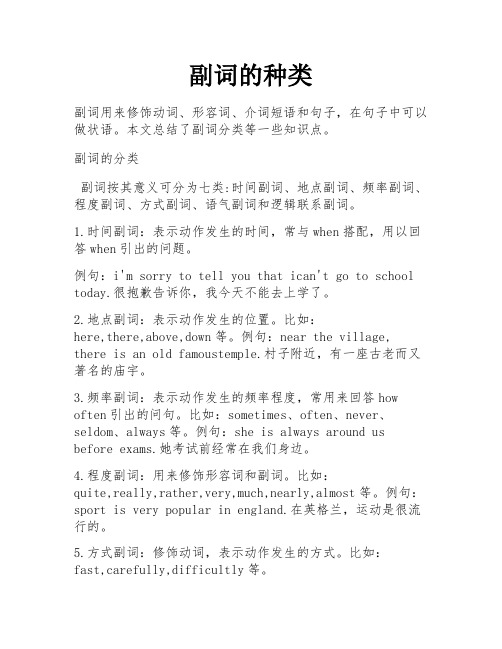
副词的种类副词用来修饰动词、形容词、介词短语和句子,在句子中可以做状语。
本文总结了副词分类等一些知识点。
副词的分类副词按其意义可分为七类:时间副词、地点副词、频率副词、程度副词、方式副词、语气副词和逻辑联系副词。
1.时间副词:表示动作发生的时间,常与when搭配,用以回答when引出的问题。
例句:i'm sorry to tell you that ican't go to school today.很抱歉告诉你,我今天不能去上学了。
2.地点副词:表示动作发生的位置。
比如:here,there,above,down等。
例句:near the village, there is an old famoustemple.村子附近,有一座古老而又著名的庙宇。
3.频率副词:表示动作发生的频率程度,常用来回答how often引出的问句。
比如:sometimes、often、never、seldom、always等。
例句:she is always around us before exams.她考试前经常在我们身边。
4.程度副词:用来修饰形容词和副词。
比如:quite,really,rather,very,much,nearly,almost等。
例句:sport is very popular in england.在英格兰,运动是很流行的。
5.方式副词:修饰动词,表示动作发生的方式。
比如:fast,carefully,difficultly等。
6.语气副词:修饰整个句子,用来表示说话者的态度。
比如:certainly,surely,maybe,perhaps等。
例句:maybe you would feel very sadand start to plain about the weather.或许你会感到很难过,并且开始抱怨这天气。
7.逻辑连接副词:修饰整个句子,表明上下句之间的逻辑关系。
英语中的副词
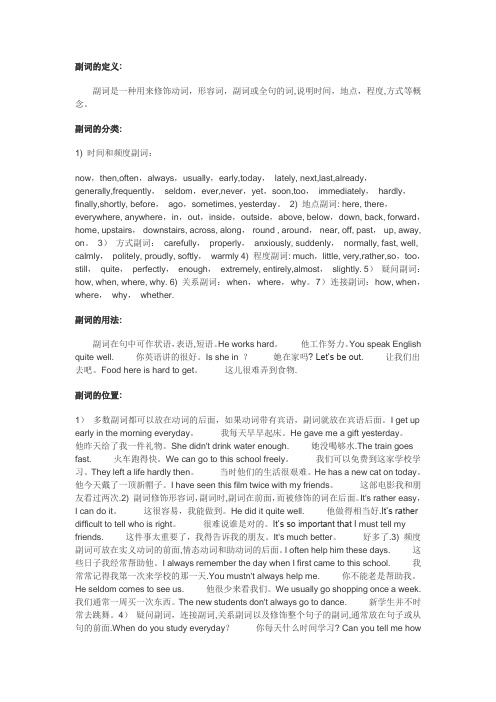
副词的定义:副词是一种用来修饰动词,形容词,副词或全句的词,说明时间,地点,程度,方式等概念。
副词的分类:1) 时间和频度副词:now,then,often,always,usually,early,today,lately, next,last,already,generally,frequently,seldom,ever,never,yet,soon,too,immediately,hardly,finally,shortly, before,ago,sometimes, yesterday。
2) 地点副词: here, there,everywhere, anywhere,in,out,inside,outside,above, below,down, back, forward,home, upstairs,downstairs, across, along,round , around,near, off, past,up, away, on。
3)方式副词:carefully,properly,anxiously, suddenly,normally, fast, well, calmly,politely, proudly, softly,warmly 4) 程度副词: much,little, very,rather,so,too,still,quite,perfectly,enough,extremely, entirely,almost,slightly. 5)疑问副词:how, when, where, why. 6) 关系副词:when,where,why。
7)连接副词:how, when,where,why,whether.副词的用法:副词在句中可作状语,表语,短语。
He works hard。
他工作努力。
You speak English quite well. 你英语讲的很好。
英语语法副词的种类及分析
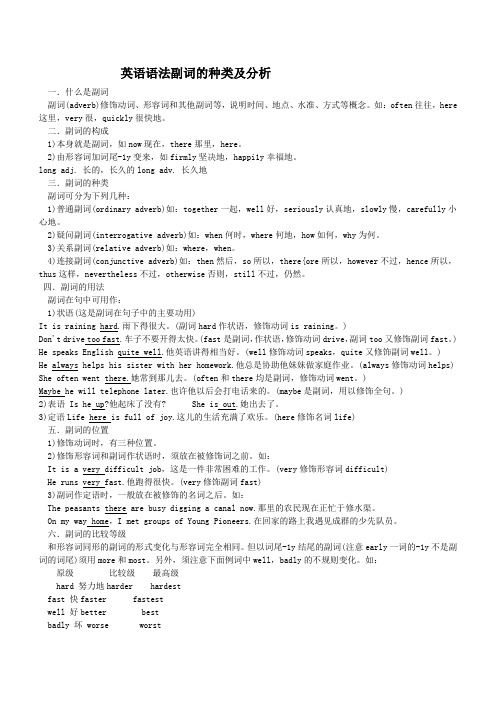
英语语法副词的种类及分析一.什么是副词副词(adverb)修饰动词、形容词和其他副词等,说明时间、地点、水准、方式等概念。
如:often往往,here 这里,very很,quickly很快地。
二.副词的构成1)本身就是副词,如now现在,there那里,here。
2)由形容词加词尾-1y变来,如firmly坚决地,happi1y幸福地。
long adj. 长的,长久的long adv. 长久地三.副词的种类副词可分为下列几种:1)普通副词(ordinary adverb)如:together一起,well好,seriously认真地,slowly慢,carefully小心地。
2)疑问副词(interrogative adverb)如:when何时,where何地,how如何,why为何。
3)关系副词(relative adverb)如:where,when。
4)连接副词(conjunctive adverb)如:then然后,so所以,there{ore所以,however不过,hence所以,thus这样,nevertheless不过,otherwise否则,still不过,仍然。
四.副词的用法副词在句中可用作:1)状语(这是副词在句子中的主要功用)It is raining hard.雨下得很大。
(副词hard作状语,修饰动词is raining。
)Don't drive too fast.车子不要开得太快。
(fast是副词,作状语,修饰动词drive,副词too又修饰副词fast。
) He speaks English quite well.他英语讲得相当好。
(well修饰动词speaks,quite又修饰副词well。
)He always helps his sister with her homework.他总是协助他妹妹做家庭作业。
(always修饰动词helps) She often went there.她常到那儿去。
英语副词分类详解
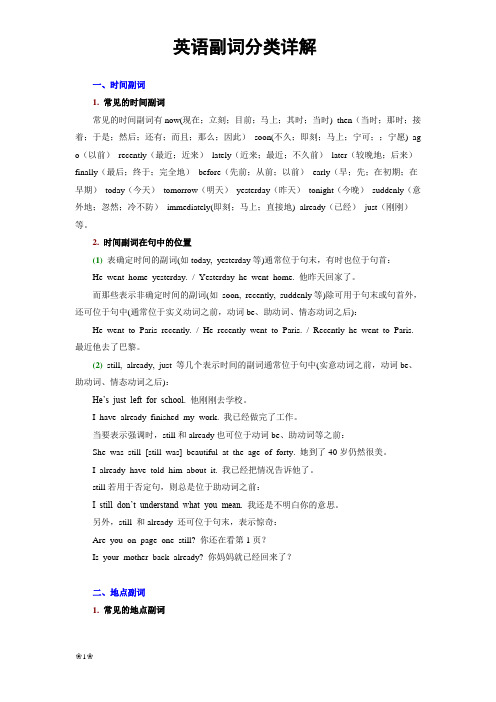
英语副词分类详解一、时间副词1.常见的时间副词常见的时间副词有now(现在;立刻;目前;马上;其时;当时) then(当时;那时;接着;于是;然后;还有;而且;那么;因此)soon(不久;即刻;马上;宁可;;宁愿) ag o(以前)recently(最近;近来)lately(近来;最近;不久前)later(较晚地;后来)finally(最后;终于;完全地)before(先前;从前;以前)early(早;先;在初期;在早期)today(今天)tomorrow(明天)yesterday(昨天)tonight(今晚)suddenly(意外地;忽然;冷不防)immediately(即刻;马上;直接地) already(已经)just(刚刚)等。
2.时间副词在句中的位置(1)表确定时间的副词(如today, yesterday等)通常位于句末,有时也位于句首:He went home yesterday. / Yesterday he went home. 他昨天回家了。
而那些表示非确定时间的副词(如soon, recently, suddenly等)除可用于句末或句首外,还可位于句中(通常位于实义动词之前,动词be、助动词、情态动词之后):He went to Paris recently. / He recently went to Paris. / Recently he went to Paris. 最近他去了巴黎。
(2)still, already, just 等几个表示时间的副词通常位于句中(实意动词之前,动词be、助动词、情态动词之后):He’s just left for school. 他刚刚去学校。
I have already finished my work. 我已经做完了工作。
当要表示强调时,still和already也可位于动词be、助动词等之前:She was still [still was] beautiful at the age of forty. 她到了40岁仍然很美。
英语副词分类详解
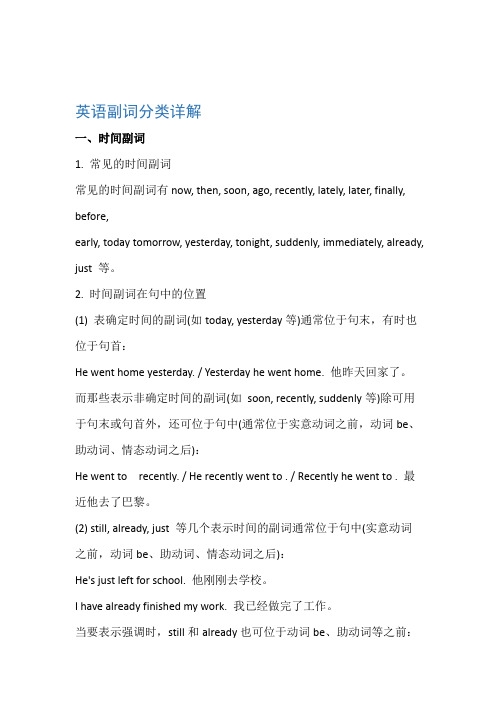
英语副词分类详解一、时间副词1. 常见的时间副词常见的时间副词有now, then, soon, ago, recently, lately, later, finally, before,early, today tomorrow, yesterday, tonight, suddenly, immediately, already, just 等。
2. 时间副词在句中的位置(1) 表确定时间的副词(如today, yesterday等)通常位于句末,有时也位于句首:He went home yesterday. / Yesterday he went home. 他昨天回家了。
而那些表示非确定时间的副词(如soon, recently, suddenly等)除可用于句末或句首外,还可位于句中(通常位于实意动词之前,动词be、助动词、情态动词之后):He went to recently. / He recently went to . / Recently he went to . 最近他去了巴黎。
(2) still, already, just 等几个表示时间的副词通常位于句中(实意动词之前,动词be、助动词、情态动词之后):He's just left for school. 他刚刚去学校。
I have already finished my work. 我已经做完了工作。
当要表示强调时,still和already也可位于动词be、助动词等之前:She was still [still was] beautiful at the age of forty. 她到了40岁仍然很美。
I already have told him about it. 我已经把情况告诉他了。
still若用于否定句,则总是位于助动词之前:I still don't understand what you mean. 我还是不明白你的意思。
副词和副词的再分类

副词和副词的再分类副词是一种修饰动词、形容词或其他副词的词类,用来描述动作、状态或程度等方面的具体情况。
根据修饰对象的不同,副词可以分为以下几类:1. 状语副词(Adverbs of Manner):描述动作发生的方式,如quickly(快速地)、carefully(小心地)、loudly(大声地)等。
2. 时间副词(Adverbs of Time):指示动作发生的时间,如yesterday(昨天)、today(今天)、soon(不久)等。
3. 地点副词(Adverbs of Place):说明动作发生的地点,如here(在这里)、there(在那里)、everywhere(到处)等。
4. 程度副词(Adverbs of Degree):表示动作或状态的程度,如very(非常)、too(太)、almost(几乎)等。
5. 疑问副词(Adverbs of Interrogation):用于提问句,如why(为什么)、when(什么时候)、where(在哪里)等。
6. 连接副词(Conjunctive Adverbs):用于连接句子或从句,如however(然而)、therefore(因此)、moreover(而且)等。
除了上述常见分类外,副词还可以根据其他特征进行细分,例如:- 频率副词(Adverbs of Frequency):表示动作发生的频率,如always(总是)、never(从不)、often(经常)等。
- 态度副词(Adverbs of Attitude):表达说话者的态度,如fortunately(幸运地)、hopefully(有希望地)、frankly(坦率地)等。
- 强调副词(Emphatic Adverbs):用于加强语气,如really(确实)、indeed(的确)、absolutely(绝对地)等。
通过对副词的再分类,我们可以更好地理解和运用这一重要的词类,使语言表达更加准确、生动和富有层次。
英语副词分类详解
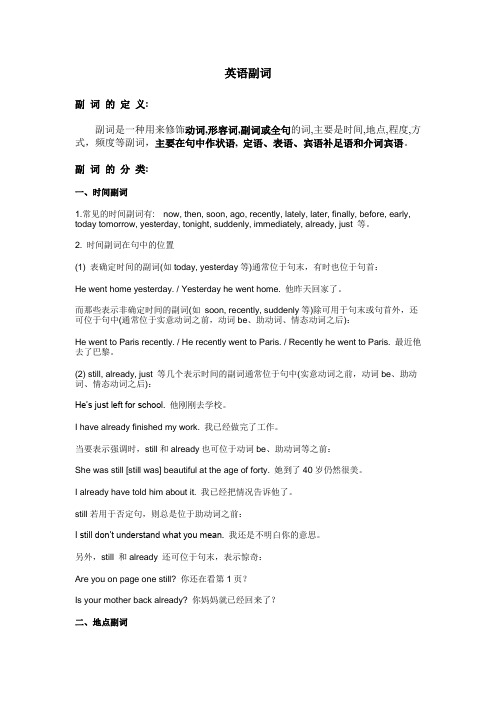
英语副词副词的定义:副词是一种用来修饰动词,形容词,副词或全句的词,主要是时间,地点,程度,方式,频度等副词,主要在句中作状语, 定语、表语、宾语补足语和介词宾语。
副词的分类:一、时间副词1.常见的时间副词有: now, then, soon, ago, recently, lately, later, finally, before, early, today tomorrow, yesterday, tonight, suddenly, immediately, already, just 等。
2. 时间副词在句中的位置(1) 表确定时间的副词(如today, yesterday等)通常位于句末,有时也位于句首:He went home yesterday. / Yesterday he went home. 他昨天回家了。
而那些表示非确定时间的副词(如soon, recently, suddenly等)除可用于句末或句首外,还可位于句中(通常位于实意动词之前,动词be、助动词、情态动词之后):He went to Paris recently. / He recently went to Paris. / Recently he went to Paris. 最近他去了巴黎。
(2) still, already, just 等几个表示时间的副词通常位于句中(实意动词之前,动词be、助动词、情态动词之后):He’s just left for school. 他刚刚去学校。
I have already finished my work. 我已经做完了工作。
当要表示强调时,still和already也可位于动词be、助动词等之前:She was still [still was] beautiful at the age of forty. 她到了40岁仍然很美。
I already have told him about it. 我已经把情况告诉他了。
- 1、下载文档前请自行甄别文档内容的完整性,平台不提供额外的编辑、内容补充、找答案等附加服务。
- 2、"仅部分预览"的文档,不可在线预览部分如存在完整性等问题,可反馈申请退款(可完整预览的文档不适用该条件!)。
- 3、如文档侵犯您的权益,请联系客服反馈,我们会尽快为您处理(人工客服工作时间:9:00-18:30)。
英语副词分类详解Company Document number:WUUT-WUUY-WBBGB-BWYTT-1982GT英语副词分类详解一、时间副词1.常见的时间副词常见的时间副词有now, then, soon, ago, recently, lately, later, finally, before, early, today tomorrow, yesterday, tonight, suddenly, immediately, already, just等。
2.时间副词在句中的位置(1)表确定时间的副词(如today, yesterday等)通常位于句末,有时也位于句首:He went home yesterday. / Yesterday he went home.他昨天回家了。
而那些表示非确定时间的副词(如soon, recently, suddenly等)除可用于句末或句首外,还可位于句中(通常位于实意动词之前,动词be、助动词、情态动词之后):He went to Paris recently. / He recently went to Paris. / Recently he went to Paris.最近他去了巴黎。
(2)still, already, just等几个表示时间的副词通常位于句中(实意动词之前,动词be、助动词、情态动词之后):He’s just left for school.他刚刚去学校。
I have already finished my work.我已经做完了工作。
当要表示强调时,still和already也可位于动词be、助动词等之前:She was still [still was] beautiful at the age of forty.她到了40岁仍然很美。
I already have told him about it.我已经把情况告诉他了。
still若用于否定句,则总是位于助动词之前:I still don’t understand what you mean.我还是不明白你的意思。
另外,still和already还可位于句末,表示惊奇:Are you on page one still你还在看第1页Is your mother back already你妈妈就已经回来了二、地点副词1.常见的地点副词常见的地点副词有here, there, up, down, away, nearby, home, ahead, abroad, indoors, overseas, halfway, upstairs, downstairs等。
2.地点副词在句中的位置地点副词在句中通常位于句末或句首,但从不位于主语和谓语之间。
若有多个副词排列,地点副词通常位于方式副词之后,时间副词之前:Can you help to carry this table upstairs你能帮忙把桌子搬到楼上去吗The boy read quietly over there all afternoon.这男孩整个下午都在那儿静静地看书。
三、方式副词1.方式副词的特点方式副词表示动词的行为方式,许多以-ly结构的副词都是方式副词,如carefully, happily, quietly, heavily, warmly, correctly, politely, angrily等。
2.方式副词在句中的位置(1)方式副词通常位于动词(及其宾语)之后:He read the letter slowly.他从容不迫地看了那封信。
方式副词通常不位于动词与宾语之间,除非动词后的宾语很长:不可说:We like very much it. (应改为We like it very much.)但可说:We could see very clearly a strange light ahead of us.我们可以很清楚地看到在我们前方有一道奇怪的光。
若遇到“动词+介词+宾语”结构,方式副词既可位于“介词+宾语”之前,也可位于“介词+宾语”之后,但是若该结构的宾语较长,则方式副词通常位于“介词+宾语”之前:He looked at me curiously. / He looked curiously at me.他好奇地打量着我。
He looked curiously at everyone who got off the plane.他好奇地打量着从飞机上走下来的每一个人。
(2)方式副词(主要是单个的方式副词)有时也可位于主语与动词之间:He quickly got dressed.他赶紧穿好衣服。
He angrily tore up the letter.他很生气,把信撕碎了。
(3)有的方式副词(如bravely, cleverly, cruelly, foolishly, generously, kindly, secretly, simply等)位于动词之前和位于句末会导致句子意思的变化:They secretly decided to leave the town.他们秘密决定离开这个城市。
They decided to leave the town secretly.他们决定秘密地离开这个城市。
He answered the questions foolishly.他对这个问题作了愚蠢的回答。
He foolishly answered the questions.他愚蠢地回答了这个问题。
(4)有的方式副词(如gently, quietly, slowly, suddenly等)有时可位于句首,以达到某种戏剧性的效果(这主要见于书面语中):Suddenly, the driver started the engine.突然地,司机启动了发动机。
四、频度副词1.频度副词的特点频度副词表示动作发生的次数,常见有的ever, never, rarely, seldom, once, often, occasionally, constantly, frequently, usually, continually, always等。
2.频度副词在句中的位置频度副词通常位于实意动词之前,动词be、助动词、情态动词之后:He often comes to see us.他常来看我们。
He is seldom late for school.他上学很少迟到。
有时为了强调,频度副词也可位于动词be、助动词等之前:She always was late.她老是迟到。
有的频度副词可位于句末(尤其受very, only修饰时):I get paid on Fridays usually.我通常在星期五领工资。
We go out very seldom.我们很少外出。
Do you go to the cinema very often你常去看电影吗有的频度副词(如sometimes, often, usually, frequently, occasionally等)可位于句首(此时多半是因为强调或对比):Sometimes he went there by bus.有时他坐公共汽车去那儿。
Very often the phone rings when I’m in the bath.电话经常在我洗澡时响。
【注】含有否定意义的频度副词置于句首时,其后要用倒装语序:Never have I been there.我从未去过那儿。
Seldom does he see a film.他很少看电影。
另外,频度副词always和never通常不位于句首,除非是祈使句:Always remember this.时刻记住这一点。
Never go out at night.晚上千万不要出去。
3.频度副词在否定句中的位置在否定句中,有的频度副词可位于否定词not之后或之前(如usually, often),有的频度副词则必须位于否定词之后(如always, constantly, continually, continuously,均含有“连续不断”之意),而有的频度副词却必须要位于否定词not之前(如sometimes, frequently):He doesn’t usually come here. / He usually doesn’t come here.他通常不来这儿。
She doesn’t always come late.她并非总是迟到。
(不能说always doesn’t)He is sometimes not responsible for what he does.他有时对所做的事不负责任。
五、程度副词1.程度副词的特点程度副词用于表示程度,常见的有fairly, pretty, rather, quite, very, much, too, greatly, almost, nearly, half, highly, awfully, deeply, partly, perfectly, really等。
2.程度副词的用法注意点(1)程度副词主要用于修饰形容词和副词,有的还可修饰比较级(如much, rather等)和最高级(如quite, much, almost等):Houses are much more expensive these days.如今的房价贵多了。
This is quite [much] the most expensive radio here.这是这里最贵的收音机。
【注】quite有时也修饰比较级,但只用于quite better(身体康复)这一表达。
(2)有的程度副词(如quite, rather, almost等)可修饰动词,但有的(如fairly, pretty, very等)则不能修饰动词:I quite agree with you.我完全同意你的意见。
(不用fairly, pretty, very)We rather like the film.我们很喜欢这部电影。
(不用fairly, pretty, very)(3)个别的程度副词(主要是quite和rather)还可修饰名词(注意词序):It’s quite [rather] a good idea. / It’s a quite [rather] good idea.那可真是个好主意。
若此结构中没有形容词,则quite和rather则只能放在冠词之前:It was quite [rather] a success.那事相当成功。
六、连接副词1.连接副词的分类连接副词可分为两类,一类是用于连接句子或从句,常见的有therefore, besides, otherwise, however, moreover, still, thus, meanwhile等;另一类是用于引导从句或不定式,主要的有when, why, where, how等。
